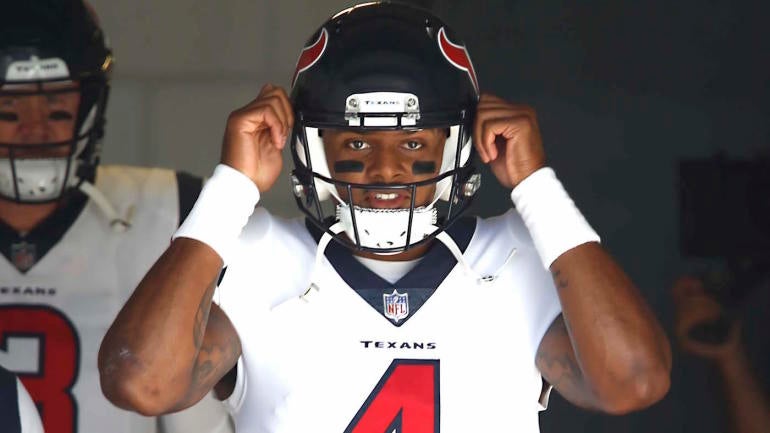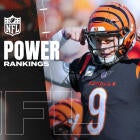
Deshaun Watson's trade to the Browns has the potential to be the NFL's most significant transaction during the salary cap era, which began in 1994. The draft capital in the trade won't be the reason. The Texans dealt Watson and a 2024 sixth-round pick for 2022, 2023 and 2024 first-round picks, a 2022 fourth-round pick, a 2023 third-round pick and a 2024 fourth-round pick.
Nobody expected Watson to get a fully guaranteed five-year, $230 million contract in the process especially considering the sexual assault and misconduct allegations he's still facing. The quarterback had four years worth $136 million remaining on the four year contract extension averaging $39 million per year he signed in September 2020.
The Browns "pulled a rabbit out of the hat" with the help of the new contract. Watson had narrowed the teams he was willing to waive his no trade clause for down to the Falcons and Saints. The Browns had barely missed the cut prior to the new contract entering the equation.
The record for guarantees in an NFL contract is shattered with Watson's deal. He more than doubles the amount fully guaranteed at signing in Packers quarterback Aaron Rodgers' new contract, which is widely considered to be $150.815 million over three years, although there are two additional below market years in the deal.
Rodgers had set new standards for guaranteed money with football contracts in becoming the NFL's first $50 million per year player. He has $150.665 million in total guarantees and $101.515 million fully guaranteed.
Watson has the type of guaranteed money typically reserved for the most lucrative NBA contracts. For example, Bucks forward Giannis Antetokounmpo, the 2019 and 2020 NBA MVP, signed a five-year extension in December 2020 that took effect this season worth a fully guaranteed $228,200,420.
The four-year extension Warriors All-NBA guard Steph Curry signed last August that begins next season is for a fully guaranteed $215,353,662. The five years, including the 2021-22 season, Curry is currently under contract total a fully guaranteed $261,134,628. Unlike the NFL, fully guaranteed contracts are the norm in MLB and the NBA.
The history of NFL game-changers
History can't repeat itself in order for Watson's contract to forever change the NFL's economic landscape. The three-year, $84 million deal quarterback Kirk Cousins received from the Vikings in 2018 free agency was the NFL's first lucrative fully guaranteed veteran contract.
Cousins set the stage for other high profile players to push for fully guaranteed contracts. Any momentum there could have been for additional fully guaranteed contracts stopped after Matt Ryan and Rodgers signed extensions in the following months in 2018. The Falcons made Ryan the NFL's first $30 million per year player on a five year extension with $94.5 million fully guaranteed at signing. Rodgers surpassed Ryan as the league's highest paid player at $33.5 million with his four year extension that preseason. He had $78.7 million fully guaranteed in the deal, which was less than the amount in Cousins' contract.
Ryan held the mark for the most money fully guaranteed in an NFL contract for nearly three years. That was until Dak Prescott signed his four-year, $160 million deal with $95 million fully guaranteed at signing last March to remain the Cowboys' quarterback.
Why NFL's funding rules could be big obstacle
One potential obstacle to Watson opening the flood gates to fully guaranteed contracts is the NFL's funding rules. The new NFL collective bargaining agreement ratified in 2020 modified the NFL's archaic funding requirements which necessitated teams putting into an escrow account the amount of any guarantees in a contract other than those just for injury, including ones in future contract years. The new rules are as follows:
The NFL may require that by a prescribed date certain, each Club must deposit into a segregated account the present value, calculated using the Discount Rate, less $15,000,000 (the "Deductible"), of deferred and guaranteed compensation owed by that Club with respect to Club funding of Player Contracts involving deferred or guaranteed compensation; provided, however, that with respect to guaranteed contracts, the amount of unpaid compensation for past or future services to be included in the funding calculation shall not exceed seventy-five (75%) percent of the total amount of the contract compensation. The present value of any future years' salary payable to a player pursuant to an injury guarantee provision in his NFL Player Contract(s), shall not be considered owed by a Club under this Section until after the Club has acknowledged that the player's injury qualifies him to receive the future payments. The $15,000,000 Deductible referenced in the first sentence of this Section 9 shall apply to the 2020-28 League Years only. This Deductible shall increase to $17,000,000 for the 2029-30 League Years.
The funding issue will be most problematic for NFL teams with the poorest owners (among a group of the super wealthy). When I was an agent, I used to hear from team contract negotiators quite often that ideas I proposed couldn't be done because of funding.
A conversation I had recently with a former team executive confirmed my suspicions about teams ability to fund guarantees. He said his owner had given him permission to blame his inability to do something contractually that an agent wanted on the funding problem at his discretion or whenever it suited him. Teams continuing to use the funding requirements as a convenient excuse is expected.
There will likely be teams insisting that Watson's case is an outlier because of unique circumstances where multiple teams were recruiting him to waive his no trade clause. Some might try to take the position that Watson was more like a free agent than the typical contract extension candidate where there's a closed negotiation only with the player's team.
It wouldn't be surprising for teams to try to entice players/agents to accept the traditional contract structure where the first two years (and possibly the third) are fully guaranteed in the most lucrative multi-year deals with a larger than normal signing bonus. Prescott's $66 million signing bonus is the biggest ever in an NFL contract. Teams might be more comfortable with a dramatic increase in the top signing bonuses than fully guaranteeing contracts.
Two worth watching
Two situations worth watching this offseason are Lamar Jackson's and Kyler Murray's, since both quarterbacks are eligible to sign new contracts. Murray, who has two years left on his rookie contract, has been putting pressure both privately and publicly on the Cardinals about getting a new deal done as soon as possible. It's conceivable that Murray could eventually request a trade if the Cardinals try to minimize the impact of Watson's new deal in contract discussions.
Jackson is more of an enigma contractually because he doesn't have an agent. Presumably, he has competent advisors to help with the process. Jackson tabled discussions last year during training camp to focus on football. 2022 is his contract year. Jackson is scheduled to play under a $23.016 million fifth year option.
There have been reports that Jackson isn't afraid of playing the franchise tag game like Cousins did before getting his fully guaranteed contract in free agency. The Ravens believing the 2019 NFL MVP is willing to embrace franchise tags could lead to a Watson type deal this offseason or 2023.
... and a few others
Newly acquired Broncos quarterback Russell Wilson has two years left on his contract worth $50 million. Mark Rodgers, Wilson's agent, hasn't been afraid to think outside of the box. He reportedly proposed tying Wilson's compensation in the latter years of a contract to the growth in salary cap during previous negotiations with the Seahawks. A fully guaranteed contract might be particularly appealing to Rodgers because of his experience as a baseball agent where he's accustomed to dealing with completely secure deals.
2020 first round picks Joe Burrow and Justin Herbert could be the litmus test for fully guaranteed contracts in 2023 if nobody else has capitalized on Watson's. In just two NFL seasons with the Bengals and Chargers respectively, Burrow and Herbert have entered into the elite quarterback discussion. 2020 first round picks will be eligible to sign contract extensions once the 2022 regular season ends next January.
One thing that seems destined to change because of the security in Watson's deal, at least for Burrow, is Cincinnati's antiquated contract structure. Bengals veteran contracts are vanilla.
The only true guaranteed money is in a signing bonus. A refusal to include traditional guarantees in any new contract will surely be a deal breaker for Burrow at this point.





















